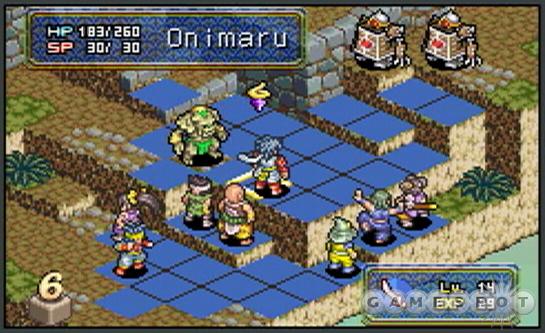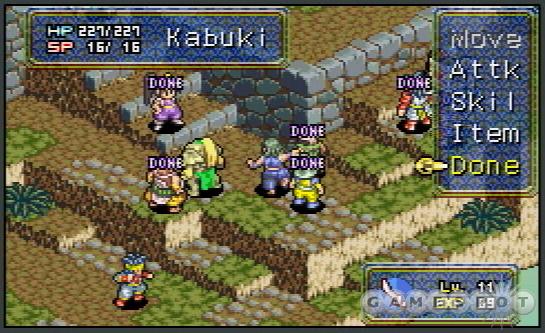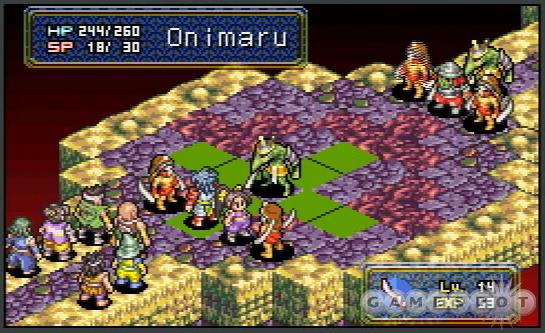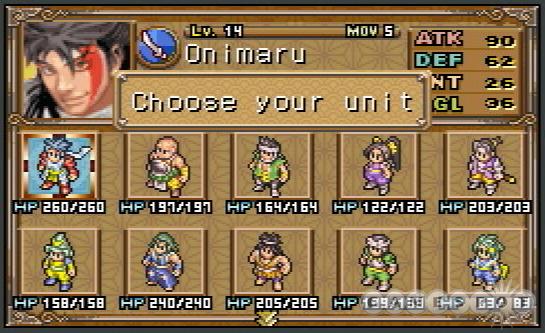Based on Capcom's popular series of demon-slaying samurai action adventure games, Onimusha Tactics combines the premise, theme, and characters of that series with gameplay similar to other strategy role-playing games such as Final Fantasy Tactics Advance or Tactics Ogre: The Knight of Lodis. That's a recipe for success if ever there was one, but while Onimusha Tactics delivers the familiar look and mechanics of other strategy RPGs, it doesn't have the same level of depth. It can be a challenging game, but that challenge mostly comes from having to slug it out through many battles against increasingly strong foes, rather than from having to make complex tactical decisions during those battles.

Onimusha Tactics shares the same story as all the games in the series: The evil warlord Nobunaga has risen from the dead and is ransacking feudal Japan in a vengeful act against the living. He commands armies of genma, Japanese demons that take the form of the living dead, as well as other, more terrible incarnations. Most resistance against Nobunaga is summarily squashed, but one man, Onimaru, stands a chance of vanquishing this evil threat where others have failed. In the first few minutes of the game, Onimaru is told that he is descended from a clan destined to vanquish the genma, and he quickly accepts his destiny--along with a gauntlet that can absorb genma souls. Thus begins Onimaru's series of battles against Nobunaga's forces. The game is organized as a linear series of "episodes," each one revealing a bit of the game's storyline and serving up a fight pitting Onimaru and up to seven of his cohorts against a gaggle of genma.
In between episodes, you'll automatically proceed along a world map to your next destination. Initially you have no options but to save your progress or begin the next battle. Later, though, you'll be able take the time between encounters to craft new items or enhance existing items for your troops, as well as to venture into a phantasmal plane, in which you can fight waves of genma for experience points (and a special bonus if you can get all the way through these levels). Most RPGs or strategy RPGs let you buy and sell equipment by visiting various shops around the world. There are no shops in Onimusha Tactics, but the item crafting system is functionally identical. Basically, as you defeat genma in battle, you'll automatically acquire a variety of different "genma stones." These may then be transmuted into different items--provided you've found the proper "recipe." Recipes are randomly found when a genma is defeated, and later they can also be stolen from certain foes. A recipe will allow you to make new weapons, armor, accessories, or items using a certain number of your stones.

Additionally, weapons and armor may be enhanced using a system similar to that of the previous Onimusha games. Whenever Onimaru or one of his allies kills a genma, its soul is absorbed by his gauntlet--these souls, in turn, are a sort of currency for item enhancement. Each weapon or suit of armor may be upgraded four times, and every subsequent step costs more souls. In practice, you won't be able to upgrade all your weapons or armor, and you'll find that weapon upgrades give you more value for your genma souls, so you'll probably conserve your resources for those. Also of note, like in other Onimusha games, the way in which you defeat your foes influences how many souls you get. If you're fortunate to kill a genma with a critical hit, you'll get a bunch more souls than usual. Most characters in Onimusha Tactics can also use the "issen" technique, a defensive countermove that randomly becomes available, allowing the character to instantly slay a foe attempting to directly attack that character in the next round. Issen moves, in addition to being cool-looking instant-kill moves, also net you a ton of souls.
The fact that the issen technique becomes available randomly is evidence to the relative lack of depth in Onimusha Tactics. Strategy RPGs should be all about careful planning and the careful balance of risk versus reward. However, Onimusha Tactics doesn't really reward you for going out of your way to plan complex strategies. For example, unlike other, similar games, Onimusha Tactics doesn't seem to give you an advantage for attacking foes from the flank or from behind. Also, though your characters will earn a few different special techniques as they gain experience levels, they'll largely depend on one type of weapon to do all their damage. So, for instance, sword-wielding characters can upgrade to better swords, but that's it. Some genma obviously present different types of challenges than others--some may attack with powerful ranged spells, while others may explode when defeated, damaging all adjacent units. But there still isn't much variety to these battles, except for a few more-scripted battles that will throw a few surprises your way.
The artificial intelligence of your foes leaves a lot to be desired. They'll sometimes gang up on one member of your party, but it's easy to distract them or spread them out. In most cases, enemies won't even approach you until you're close enough for them to hit you during their turns, a cheap trick that makes the battles last longer than they should. On that subject, do yourself a favor if you play this game and make it your first order of business to switch to the "fast" animation setting from the default setting. As a turn-based game, Onimusha Tactics is inherently rather slow, but unless you opt for this faster setting, the action will be painfully slow even for a game in this genre. Also, Onimusha Tactics doesn't incorporate an initiative-based turn system, meaning you get to move all your troops in any order during your turn, followed by the enemy, and so on, until one side or the other wins. This again diminishes the game's strategic complexity. A ninja-type character is capable of moving farther during his or her turn than, say, a hefty pikeman or some lumbering genma, but it doesn't benefit from being able to attack more often. With all of that said, Onimusha Tactics basically plays OK, but its relative lack of strategic depth makes it less engaging than what you might be accustomed to from other games in this genre.

Interestingly, there are no generic characters in Onimusha Tactics as there are in virtually all other strategy RPGs. Each of Onimaru's companions is a unique character with his or her own portrait and character sprite, and each is introduced along the course of the story. Some, such as the rifleman Magoichi, you may recognize from other Onimusha games. All have Japanese names, so expect to become familiar with guys like Ekei and Yoichi; actually, the very Japanese flavor of this game will be one of its main attractions for some audiences, though the proceedings, especially some of the humor, will seem a little too foreign to someone not otherwise interested in the game's subject matter.
As you'd expect, some of the characters figure more prominently into the events that unfold than others do, and most characters end up being relegated to supporting roles. It ends up being your choice, for the most part, as to whom to bring into battle. Usually, a balance of heavy hitters, ranged attackers, and supporting units such as ninjas or healers is a good idea. Since you'll fortunately get to take a look at what you're up against on the battlefield prior to having to choose which forces to bring to bear, you'll intuitively know when it would be a good bet, for instance, to throw all your ranged fighters into the mix. Still, since you'll end up with many more than the maximum of eight characters per battle, you'll probably end up settling on a consistent starting lineup and neglecting most of the other characters, who won't gain any experience sitting on the sidelines and will therefore become pretty useless as you get further into the game.

Onimusha Tactics looks pretty good, and it's graphically comparable to other strategy RPGs for the Game Boy Advance. As mentioned, it's a nice touch that all your characters look unique, though you'll see the same types of genma over and over, and most of the environments you'll explore are drab and forgettable. There also aren't a ton of different special effects, though the ones you'll see do look quite good. The game also features some rather impressive still 2D artwork, such as for the various character portraits and the occasional cutscene. Onimusha Tactics sounds pretty good, too, replete with down-sampled versions of the sort of anime-style sword-slashing effects that fit the previous Onimusha games so well. There's a catchy soundtrack, too, though it loops a bit too often, to the point where it might get stuck in your head for the wrong reasons.
Onimusha Tactics has a great concept and some cool features, but the "tactics" part of its title is a bit of a misnomer. Ideally, strategy RPGs can make for an excellent alternative to the typical console RPG formula, which bogs you down with one bland, time-consuming random encounter after another, because strategy RPGs are supposed to offer deep and involving combat systems. Onimusha Tactics doesn't succeed on that front, but it still offers some cool characters, an interesting premise, and potentially many hours of entertainment for those willing to trade some of the richness found in the best strategy RPGs for the chance to do battle against samurai sword-swinging demons.